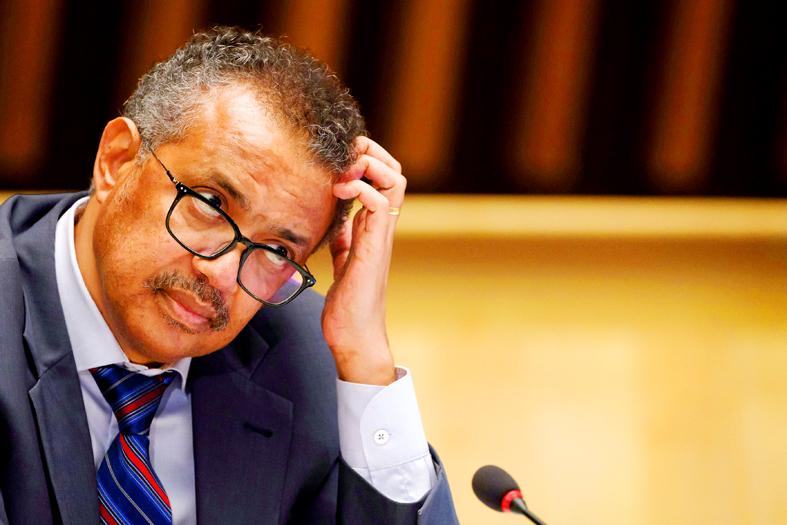Two US senators on Tuesday introduced a WHO accountability bill, seeking to withhold US funding until the organization reforms its leadership and accepts Taiwan as a member state.
US President Joe Biden has since his inauguration on Jan. 20 signed a flurry of executive orders, including one to stop the US’ withdrawal from the WHO, reversing former US president Donald Trump’s decision last year.
A WHO task force probing the origins of COVID-19 in China on Tuesday wrapped up its investigation with no breakthroughs, although it ruled out a theory that the novel coronavirus had escaped from a Chinese laboratory.

Photo: Reuters
“The mission of the WHO is to get public health information to the world so every country can make the best decisions to keep their citizens safe. The WHO not only failed its mission, but it failed the world when it comes to the coronavirus. They served as a puppet for the Chinese Communist Party — parroting misinformation and helping communist China cover up a global pandemic,” US Senator Rick Scott, a Republican, said in a news release on Tuesday.
“Last February, I called on the WHO to do its own in-depth analysis on the extent and origins of the coronavirus. It took them nearly a year to take action and we still have no answer,” he said.
“They are complicit in communist China’s effort to isolate Taiwan. There is no reason US taxpayers should be spending hundreds of millions a year, more than any other country, to fund the WHO without significant reform,” he added.
Taiwan attended the World Health Assembly, the decisionmaking body of the WHO, as an observer from 2009 to 2016, but has since been denied access.
Scott said he is proud to introduce the bill to withhold US taxpayer dollars from the WHO “until they start actually caring about public health, stop acting like a puppet for the communist China and allow Taiwan as a member.”
WHO Director-General Tedros Adhanom Ghebreyesus and other WHO leaders must be held accountable for their dereliction of duty, and the WHO should not benefit from US tax dollars again before it undertakes comprehensive reforms, US Senator Josh Hawley, also a Republican, said in the same news release.

The manufacture of the remaining 28 M1A2T Abrams tanks Taiwan purchased from the US has recently been completed, and they are expected to be delivered within the next one to two months, a source said yesterday. The Ministry of National Defense is arranging cargo ships to transport the tanks to Taiwan as soon as possible, said the source, who is familiar with the matter. The estimated arrival time ranges from late this month to early next month, the source said. The 28 Abrams tanks make up the third and final batch of a total of 108 tanks, valued at about NT$40.5 billion

Two Taiwanese prosecutors were questioned by Chinese security personnel at their hotel during a trip to China’s Henan Province this month, the Mainland Affairs Council (MAC) said yesterday. The officers had personal information on the prosecutors, including “when they were assigned to their posts, their work locations and job titles,” MAC Deputy Minister and spokesman Liang Wen-chieh (梁文傑) said. On top of asking about their agencies and positions, the officers also questioned the prosecutors about the Cross-Strait Joint Crime-Fighting and Judicial Mutual Assistance Agreement, a pact that serves as the framework for Taiwan-China cooperation on combating crime and providing judicial assistance, Liang

A group from the Taiwanese Designers in Australia association yesterday represented Taiwan at the Midsumma Pride March in Melbourne. The march, held in the St. Kilda suburb, is the city’s largest LGBTQIA+ parade and the flagship event of the annual Midsumma Festival. It attracted more than 45,000 spectators who supported the 400 groups and 10,000 marchers that participated this year, the association said. Taiwanese Designers said they organized a team to march for Taiwan this year, joining politicians, government agencies, professionals and community organizations in showing support for LGBTQIA+ people and diverse communities. As the first country in Asia to legalize same-sex

MOTIVES QUESTIONED The PLA considers Xi’s policies toward Taiwan to be driven by personal considerations rather than military assessment, the Epoch Times reports Chinese President Xi Jinping’s (習近平) latest purge of the Chinese People’s Liberation Army (PLA) leadership might have been prompted by the military’s opposition to plans of invading Taiwan, the Epoch Times said. The Chinese military opposes waging war against Taiwan by a large consensus, putting it at odds with Xi’s vision, the Falun Gong-affiliated daily said in a report on Thursday, citing anonymous sources with insight into the PLA’s inner workings. The opposition is not the opinion of a few generals, but a widely shared view among the PLA cadre, the Epoch Times cited them as saying. “Chinese forces know full well that